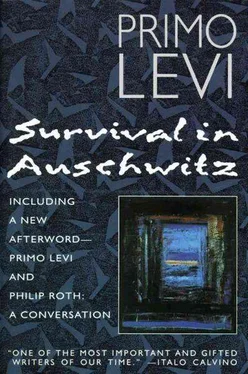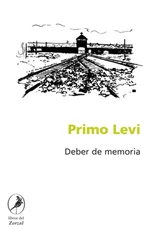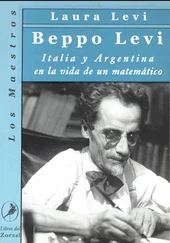Charles asked: ‘Ça roule encore?’
‘Ça roule toujours.’
It seemed as if it would never end.
21 January. Instead it ended. On the dawn of the 21st we saw the plain deserted and lifeless, white as far as the eye could see, lying under the flight of the crows, deathly sad. I would almost have preferred to see something moving again. The Polish civilians had also disappeared, hiding who knows where. Even the wind seemed to have stopped. I wanted only one thing: to stay in bed under my blankets and abandon myself to a complete exhaustion of muscles, nerve and willpower; waiting as indifferently as a dead man for it to end or not to end.
But Charles had already lighted the stove, Charles, our active, trusting, alive friend, and he called me to work:
‘Vas-y, Primo, descends-toi de là-haut; il y a Jules à attraper par les oreilles…’
‘Jules’ was the lavatory bucket, which every morning had to be taken by its handles, carried outside and emptied into the cesspool; this was the first task of the day, and if one remembers that it was impossible to wash one’s hands and that three of us were ill with typhus, it can be understood that it was not a pleasant job.
We had to inaugurate the cabbages and turnips. While I went to search for wood and Charles collected the snow for water, Arthur mobilized the patients who could sit up to help with the peeling. Towarowski, Sertelet, Alcalai and Schenck answered the call.
Sertelet was also a peasant from the Vosges, twenty years old; he seemed in good shape, but day by day his voice assumed an ever more sinister nasal timbre, reminding us that diphtheria seldom relaxes its hold.
Alcalai was a Jewish glazier from Toulouse; he was quiet and discreet, and suffered from erysipelas on the face.
Schenck was a Slovak businessman, Jewish; a typhus patient, he had a formidable appetite. Likewise Towarowski, a Franco-Polish Jew, stupid and talkative, but useful to our community through his communicative optimism.
So while the patients scraped with their knives, each one seated on his bunk, Charles and I devoted ourselves to finding a suitable site for the kitchen operations. An indescribable filth had invaded every part of the camp. All the latrines were overflowing, as naturally nobody cared any more about their upkeep, and those suffering from dysentery (more than a hundred) had fouled every corner of Ka-Be, filling all the buckets, all the bowls formerly used for the rations, all the pots. One could not move an inch without watching one’s step; in the dark it was impossible to move around. Although suffering from the cold, which remained acute, we thought with horror of what would happen if it thawed: the diseases would spread irreparably, the stench would be suffocating, and even more, with the snow melted we would remain definitively without water.
After a long search we finally found a small area of floor not excessively soiled in a spot formerly used for the laundry. We lit a live fire to save time and complications and disinfected our hands, rubbing them with chloramine mixed with snow.
The news that a soup was being cooked spread rapidly through the crowd of the semi-living; a throng of starved faces gathered at the door. Charles, with ladle uplifted, made a short, vigorous speech, which although in French needed no translation.
The majority dispersed but one came forward. He was a Parisian, a high-class tailor (he said), suffering from tuberculosis. In exchange for two pints of soup he offered to make us clothes from the many blankets still to be found in the camp.
Maxime showed himself really able. The following day Charles and I were in possession of a jacket, trousers and gloves of a rough fabric of striking colours.
In the evening, after the first soup, distributed with enthusiasm and devoured with greed, the great silence of the plain was broken. From our bunks, too tired to be really worried, we listened to the bangs of mysterious artillery groups apparently hidden on all the points of the horizon, and to the whistle of the shells over our heads.
I was thinking life outside was beautiful and would be beautiful again, and that it would really be a pity to let ourselves be overcome now. I woke up the patients who were dozing and when I was sure that they were all listening I told them, first in French and then in my best German, that they must all begin to think of returning home now, and that as far as depended on us, certain things were to be done and others to be avoided. Each person should carefully look after his own bowl and spoon; no one should offer his own soup to others; no one should climb down from his bed except to go to the latrine; if anyone was in need of anything, he should only turn to us three. Arthur in particular was given the task of supervising the discipline and hygiene, and was to remember that it was better to leave bowls and spoons dirty rather than wash them with the danger of changing those of a diphtheria patient with those of someone suffering from typhus.
I had the impression that the patients by now were too indifferent to everything to pay attention to what I had said; but I had great faith in Arthur’s diligence.
22 January. If it is courageous to face a grave danger with a light heart, Charles and I were courageous that morning. We extended our explorations to the SS camp, immediately outside the electric wire-fence.
The camp guards must have left in a great hurry. On the tables we found plates half-full of a by-now frozen soup which we devoured with an intense pleasure, mugs full of beer, transformed into a yellowish ice, a chess board with an unfinished game. In the dormitories, piles of valuable things.
We loaded ourselves with a bottle of vodka, various medicines, newspapers and magazines and four first-rate eiderdowns, one of which is today in my house in Turin. Cheerful and irresponsible, we carried the fruits of our expedition back to the dormitory, leaving them in Arthur’s care. Only that evening did we learn what happened perhaps only half an hour later.
Some SS men, perhaps dispersed, but still armed, penetrated into the abandoned camp. They found that eighteen Frenchmen had settled in the dining-hall of the SS-Waffe. They killed them all methodically, with a shot in the nape of the heck, lining up their twisted bodies in the snow on the road; then they left. The eighteen corpses remained exposed until the arrival of the Russians; nobody had the strength to bury them.
But by now there were beds in all the huts occupied by corpses as rigid as wood, whom nobody troubled to remove.
The ground was too frozen to dig graves; many bodies were piled up in a trench, but already early on the heap showed out of the hole and was shamefully visible from our window.
Only a wooden wall separated us from the ward of the dysentery patients, where many were dying and many dead. The floor was covered by a layer of frozen excrement. None of the patients had strength enough to climb out of their blankets to search for food, and those who had done it at the beginning had not returned to help their comrades. In one bed, clasping each other to resist the cold better, there were two Italians. I often heard them talking, but as I spoke only French, for a long time they were not aware of my presence. That day they heard my name by chance, pronounced with an Italian accent by Charles, and from then on they never ceased groaning and imploring.
Naturally I would have liked to have helped them, given the means and the strength, if for no other reason than to stop their crying. In the evening when all the work was finished, conquering my tiredness and disgust, I dragged myself gropingly along the dark, filthy corridor to their ward with a bowl of water and the remainder of our day’s soup. The result was that from then on, through the thin wall, the whole diarrhoea ward shouted my name day and night with the accents of all the languages of Europe, accompanied by incomprehensible prayers, without my being able to do anything about it. I felt like crying, I could have cursed them.
Читать дальше












